#i see a lot of people calling religions poison
Explore tagged Tumblr posts
Text
religion? culture?
i think a lot of people forget that religion is not just somethin you believe
because a lot of the time it's very much entrenched in identity and culture and even what is considered religious vs cultural is actually very nebulous
like chinese ancestor and confucius veneration; if you go to people's tombs, offer food, bow three times, burn joss paper (like paper fascimilies of the thing you plan to send to the netherworld) etc, should it be considered religious?
apparently, it's secular enough that chinese catholics are allowed to attend. (imagine the pope allowing a catholic to attend hindu worship) but like normally we would call this religious, no?
the very same practice described in a movie would make american christians cry about paganism
and yet as a chinese Christian the question on how much of culture we can participate in is veey muddled as the line between culture and religion is nebulous
and i think a lot of people take that separation for granted
#religion#religious#atheism#i see a lot of people calling religions poison#and like#yea sure religion is inevitable#sure bud#all cultures are poisoned#and should be replaced with your whitey pure rationality#and yet atheists dont see their cultural Christianity#even china is suppised to be atheist#but even normally atheist people maintain religious practices withoutcallin it.religious#yet its still a point of contention if it's religious in and of itswlf#*itself
3 notes
·
View notes
Text
Hospitality
Meandering River and Q'ari sit in the canteen during midday break chatting and drinking some herbal tea. The Humans introduced both the drink and the meal. They call it 'Lunch' and while only the Humans seem to need the calories supplied by the meal, the break and the tea has proven to be a big hit among the other sapients...so long as they stay away from the poisonous teas. There are a lot of poisonous teas. Most everyone can have chamomile though.
The conversation meanders as they do, and eventually, they both come to talking about things they've noticed about the humans, one of the more recent additions to the Coalition. Everybody has their own cultural and biological quirks, but the conversations has been steering towards the humans lately. Everyone is a little too quick to point out that It's not that they're... weird, it's just the differences.
Q'ari puts her tea down with a clink on the small porcelain saucer. "Did you know that the Humans have a whole thing about being nice to visitors? It’s called 'hospitality' and they have almost entire religions about it!"
"What? They have religions about being nice to people you meet?" Meandering River said, as her feathers rustle, reflecting shimmering colors.
"Pretty much! My guess is that living on their world is so hard that they just felt obligated to help people who were passing through their village or peer group or whatever. The idea was that no matter who shows up - even their enemy - you give them a meal and a bath and let them have a nap and point them towards where they need to go if they're lost." Q'ari took another sip of tea. "You weren't even supposed to ask them questions about who they were or what they were doing!"
Meander was baffled. "But that makes no sense! What if the person was going to hurt you or your group? You had no way of knowing. Better to just let them pass by, and not interact."
"Yes, but the idea is the next time it was you traveling, you'd get help from others too." Nancy said from behind them.
Q'ari fur poofed out and Meander's feathers rippled in surprise and they both slid their chairs back to jump away before stopping themselves and sitting down, tea spilled everywhere. Predator/Prey reactions were deeply ingrained in Innari and Sefigans, and Humans were exceptionally good predators, even when they didn't mean to be.
"Sorry! Sorry!" Nancy said, seeing their reaction. "I didn't mean to startle you! I just heard you talking about hospitality. People everywhere don't treat it like the religion it used to be, but it's still a common thing that people do. Here -" she said gesturing on her pad "Let me buy you both another Tea to say sorry for spilling yours. Chamomile, right? I feel so badly about startling you."
"I-It's all right, we know you didn't mean to." Meander says, smoothing their feathers automatically. We were just fascinated by the concept of hospitality. Please, join us." She gestures towards a chair.
Nancy sits down, and wipes away some of the spilled tea with a napkin. "Being polite to strangers is just something that's taught from an early age. It's not done everywhere, and it's not done the same way, but it's still done. It's... complicated though." Nancy said, as a serv platform came over with two fresh cups of tea. After it had left, she continued. "Codifying being nice to strangers and offering them a place to stay and food to eat is a way that people could travel in the time before money and hotels, but also, it could be used as a shield against forming real friendships."
"What do you mean by that? If you're inviting strangers into your house, wouldn't that help make friends?" Meander said, blowing on her tea to cool it slightly.
"Well, it could. But if the whole process is ritualized and formal, then you could use it to keep 'foreign' people at arms length. Sure, you'd invite them in, let them sleep, bathe, eat, but you'd send them on their way in the morning and that would be it. There would be no connection, no friendship. There is a long, long history of being nice without being friendly."
"It's all very confusing." Q'ari said. "There seems to be a lot of implied connections, and ritualized actions that on the surface appear kind, but may - or may not - be, depending on thousands of different things."
Nancy nodded. "Hey, things are never black and white. There is always nuance. I'm sure it's even the same way between you and your people. Q'ari, you're not originally from Sef, the homeworld, right?"
Q'ari's teddy bear shaped ears waggled. "That's right. I grew up on Llamanian, one of our middle tier colony worlds."
"And even though you are a Sefigan citizen, when you go to Sef sometimes you get treated like an outsider, right?"
"Well, I suppose a bit, yes." Q'ari's finely laquered claws slid out of their sheaths, just a centimeter. "They say that my gelbin isn't the same as on Sef. Er, that's a traditional vegetable dish." She adds, for their benefit.
Meander's crest slides up and then back down. "I've had your gelbin Q'ari, it's delicious! What could possibly be wrong?"
She shrugs, a decidedly human gesture. "The spices are wrong, they say. We have different versions due to the ecology and soil of Llamanian, even if I were to use the exact same spices in the exact same proportions, it wouldn't taste the same."
"It's not just humans. Everyone has things that are different, and people - no matter which sapient group they are - will use those differences against them sometimes." Nancy said, taking a sip of tea. "Knowing that it happens, and keeping an eye out for it, and having some understanding, can go a long way. But, that doesn't mean we shouldn't be nice to strangers when we meet them. After all, they might be the Gods in disguise!" Nancy's eyes sparkle when she said that."
"What do you mean?"
"Well, you see a people called the Greeks believed that..."
#writing#humans are deathworlders#humans are space orcs#sci fi writing#humans are space oddities#jpitha#humans and aliens
201 notes
·
View notes
Text
The average tumblr queer hates fascism and terfs, and they should, but because they have zero understanding of what those ideologies actually is, they end up repeating such ideology anyway.
They have zero understanding that it is the transmisogynist bioessentialism that makes radfemism so poisonous. So they call trans women mentioning the words "misogyny" and "patriarchy" a terf, while their use of "afab/amab" reveal that they haven't unlearned any bioessentialism and transmisogyny. I've written about this at length before.
And this intellectually lazy acceptance of reactionary thinking goes far beyond that.
Criticize the institutions of religion and the family on this supposed queer communist site, and you'll get massive cries of protest from these queer leftists. And in content if not form they are basically indistinguishable from fascist rhetoric about how "queer leftists who read too many jewish writers (like Marx and Hirschfeld) are trying to eradicate the vital institutions of tradition, religion, family and community with their soulless materialist globohomo." (Note that the link is to a critical glossary of the alt-right on rationalwiki, so there are slurs galore)
And yes, that is what i'm doing, and I'm very proud of it. Abolishing religion and the family, and all of their sanctified traditions is a very important part of the communist project. The main Jewish writer who convinced me of this is Marx, read him.
"The abolition of religion as the illusory happiness of the people is the demand for their real happiness." Literally read The Communist Manifesto, which openly calls for the abolition of the family. A lot of suppose leftists repeat what the manifesto calls "The bourgeois clap-trap about the family and education, about the hallowed co-relation of parents and child"
It's especially ironic to hear such things from self-described queers, as if family, religion and tradition aren't the most common tools used to oppress queer people.
A lot of reactionary garbage with a superficial anti-capitalist veneer has gotten into the left, which is not new. The just mentioned manifesto spends a whole chapter criticizing reactionary forms of socialism. I have myself used Marx's still valid analysis as my basis to criticize reactionary anti-capitalism.
There has been so much nationalist garbage absorbed by the left at this point that fascist thinking crop up all the time in the left. This is because planting the roots of 19th century romantic nationalism tends to bear the same fruit. And tumblr leftism is the most intellectually lazy kind of leftism.
Like your average pseudo-leftist position on nations is basically ethnopluralism, a neofascist ideology originating in the European "New right" that is trying to sell the old wine of blood-and-soil nationalism in new bottles for a postcolonial world. It's creator Henning Eichberg spent decades trying to sell his Völkisch ideology to the left. With some success, it seems like. Like the neofascist in ethnopluralist clothing position that "every culture has the right to preserve their own culture and tradition from the onslaught of global capitalist culture" is something that you'll see all the time regurgitated by supposed leftists. The one 19th century european/western concept that is seen as universally applicable is nationalism. It's bleak.
I can't even say the far-left cliché of "read theory", because a lot of theory is garbage. Not all of it though. This list comes from my libertarian marxist/"councilist" biases but Nationalism and Socialism by Paul Mattick is good, as is "Third-worldism and Socialism" an excerpt from an early 70s pamphlet by the British organization Solidarity, and the 1989 essay The Universality of Marx by Loren Goldner.
178 notes
·
View notes
Text
Merlin Loregasm Rewatch S1E4
Hi Everyone! Welcome to my rewatch of Merlin focusing on the lore. I am a giant nerd so pretty excited about this. We're on THE POISONED CHALICE
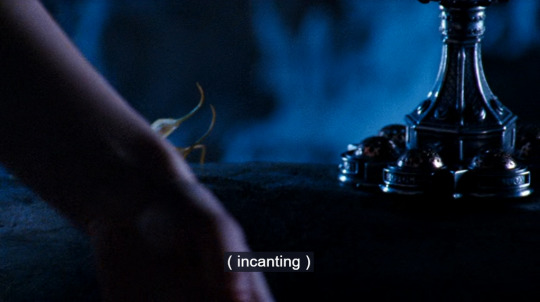
OKAY so @catsconflictscopicsandchamomile our resident Old English expert explained to me something really interesting. the spell used by Nimueh draws its power from the Spear-Danes, the semi pagan culture featured in Beowulf (Who had their own lake lady in Grendel's mother who was likely a priestess of the old religion And linguisticly called Disir) There is more though The first lines of the spell also seem to be Nimue saying she owes her magic to the spear Danes (that Grendel the monster in Beowolf ate) At this point I'm wondering if its meant to establish she is saying HEY MY SPELLS ARE PAGEN This will not be the only Beowulf reference in this episode. (Its never referenced or quoted after this episode) I'm wondering if the translators threw this in as a joke or easter egg Or in my freind's words "fuck it. lets canonize Beowulf in this universe real fast" (Okay I just discovered one of their choices I'll talk about later and HOLY FREAKING SHIT)
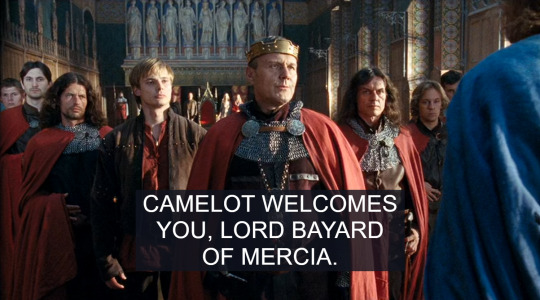
Mercia is traditionally thought of as a kingdom formed during the anglo-saxon settlement of Britain (Which occurs post Merlin acoirding to Merlin having saxons of enemies in later seasons) The historic king Arthur if he existed was said to have fought against the anglo saxons but this is just a footnote as we are focusing on Merlin Universe) HOWEVER a 13th century text says "“Pagans came from Germany and occupied East Anglia, that is, the country of the East Angles; and some of them invaded Mercia, and waged war against the British.”
British here being Original pre-saxon inhabitents. SO it is possible that a Mercia existed before The Anglo-Saxons. This could also be the Historian using the name he knows. Bayard is not a recorded later King of Mercia either so good choice in name if we want him to be a Britonic king from a Mercia founded before the Anglo-Saxons apear. Fun fact Mercia also resisted leaving paganism longer than any other Anglo-Saxon kingdom! BUT Anyway in Merlin Mercia is a thing, Its ruled by Bayard, and its color is blue. It would be in the midlands of England most likely.
Also he was at war with Camalot, but now is not. I wonder if that has to do with Uther having not inherited but taking over the kingdom! Uther: The treaty we sign today marks an end to war and the beginning of a new friendship between our peoples
I also think Uther as a peacemaker is interesting, especially as we see this more than once. It might be why some people view him as "A good king."
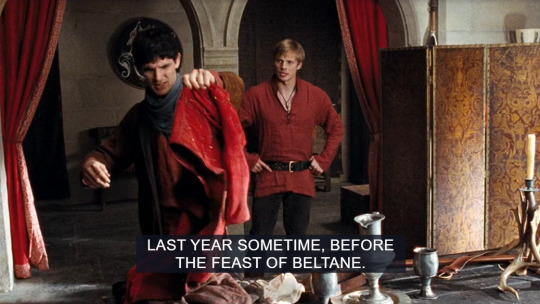
So this at first glance SEEMS like it hints more toward paganism. Beltane is a Gaelic May Day festival. But its renamed version May Day was not exactly Christianized. See most other big Gaelic festivals (usually religious) Were kinda taken over by Christianity when it came. Yule became Christmas Samhain became All Saints Day (All Hollows Eve) ETC. Beltane was also celebrated in some places ALONG with Christianity until the 1800s. (Scotland did this specifically) In modern times Beltane is VERY Pagan. And it is very possible this hints further toward the Camalot is pagan or just nonreligious side of the entire debate. (Despite people using words like god or hell.) But it's not quite as conclusive as many other type of references would be.
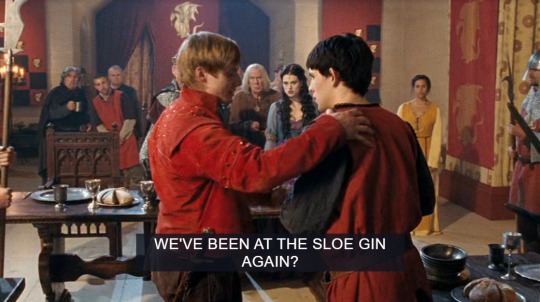
(For context despite it saying we've Arthur here is talking about Merlin, who just announced his cup was poisoned, exclusively which is interesting!) See slow gin is a type of alcohol made with juniper berries and blackthorn fruits. It was traditionally brewed (With a lot of home brewing) in October and November and used as a warming drink in the depths of winter. AS you can tell this episode does not take place in winter. I think there are two possibilities for Arthur picking this drink specifically to mention despite that. The first is that as a prince perhaps the drink is available to him year round if he wants it and he doesn't know that is not true of most people yet. The second is he is so panicked at the prospect of the trouble Merlin is in his mind latched on to the first drink that popped into it.
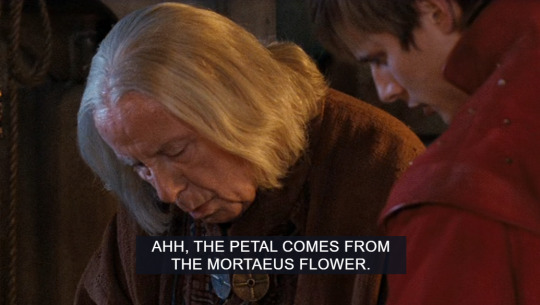
Okay, so Mort means death in Latin. And the ending suffix here Usually makes the word an adjective from proper or place names BUT often appears in flower naming. So basically this plant is named The "Death Flower" Flower or "Capital D Deathly" Flower
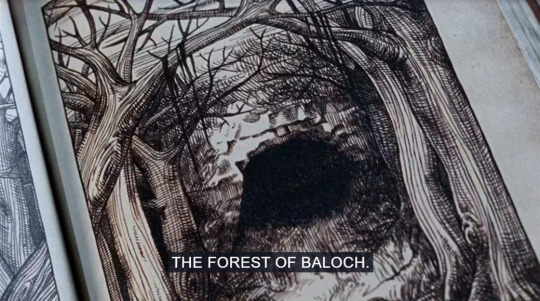
Gaius: it can only be found in the caves deep beneeth the forest of Baloch The flower grows on the roots of the Mortaeus tree.
Uh okay. THERE IS SOME SHIT GOING DOWN with this plant. First of all, flowers growing from the roots of a tree is just weird. flowers are basically there to attract things to pollinate a plant usualy. If a tree has flowers they do not grow from the roots. Second of all its kinda weird for flowers or trees to grow in DEEP caves. Sunlight cannot read them there. I would give it a pass if it did not say deep because if there were cracks in the ceiling of the cave that could put light though. It does kinda explain why they can ONLY be found there though. If its so odd and specialized it might be the only place it can grow.
This flower is either innately magical in some odd way or does not conform to evolution. So at this point I am pretty sure it was bred/engineered/magiced into being but some sorcerer. Likely specifically for poisoning people. and that person wanted to limit the people who knew of it and thus kept it in once set of caves. BUT SOMHOW news got out about it. Ok so I also looked up Baloch. In Welsh it can mean dig or sorry. In Irish it means boy and in scottish the same thing. So no info to be gleaned from that
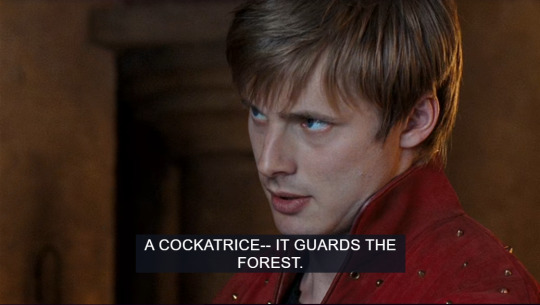
Gauis: A cockatrice-- it guards the forest. Its venom is extremely potent, a single drop would mean certain death. OK first of all I'm doubling down on there being some past sorcerer, Because they were FOR SURE using these as guard dogs. Second of all I LOVE Merlin paying fast and loose with magical creatures from folklore because I can too in my fics A Cockatrice in folklore was a monster created when a toad or snake egg was hatched beneath a chicken. It could kill with a look, or a breath, or a touch, and was basically a two-legged dragonish creature with a rooster head. In the Merlin world it is very diferant. We'll see one soon! "Few who have crossed the mountains of Isgard in search of the Moraeus flower have made it back alive." Yeah can't find any meaning behind the name Isgard! BUT HAVE I MENTIONED I THINK A SORCER ONCE LIVED IN THE CAVES/FOREST.
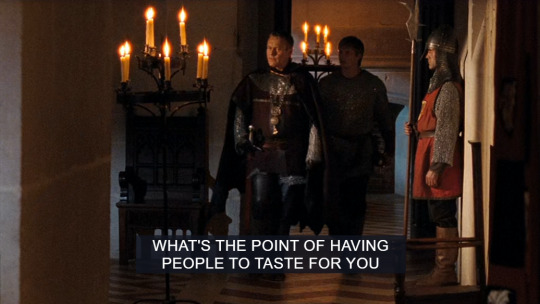
Okay I think this is a reference to the actual historical job of taster. Basically important people (ESP royalty) would hire someone to taste all their food before thay ate it. That way if it was poisoned the taster would die instead of them. It was viewed as a pretty plum gig because poisoning didn't often happen (ESP if people knew there was a taster) and the taster got to eat REALLY good food and get paid for it. I think its also an interesting character detail that while this kinda implies that Uther might have someone (At least for his private food and not banquets) We see multiple times that Arthur in fact does NOT. It is quite possible he managed to put his foot down and get out of this somehow because he believes it to be wrong. Which not gonna lie is a very Arthur thing to do.
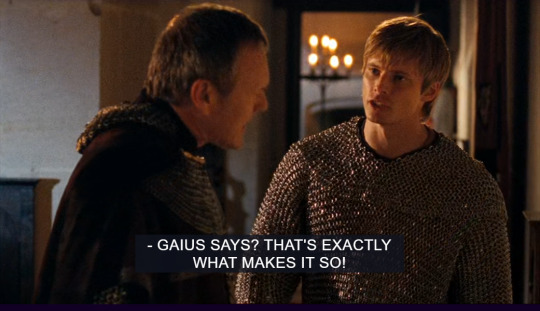
(Context: Arthur talking about how Gaius said they can save Merlin if they get the leaf so it is not a fools errand) Waiiit is this trying to imply that Gaius was the one who brought up the idea that one could use the old religion to give Uther a son? I mean we knew he was the messenger. but HOLY SHIT. And if that is true, Uther somhow forgave him? Why would Uther forgive him? The only thing I can think is if Gaius talked about how magic had tricked him and gave Uther something else to blame. This is all conjecture though. Uther could be referring on how Gaius is close to Merlin or something else. It just feels like it might be a nod at what all went down around Arthur's birth.
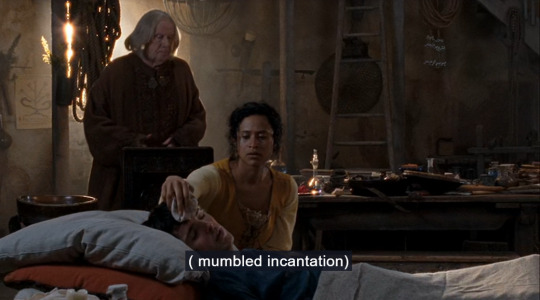
Okay so this is Merlin quoting Beowolf here. A Poem that is yet to be written down but might have had some oral tradition and actually takes place at the traditional time Arthur is said to have lived. Merlin is basically talking about how Arthur/Beowolf is endowed with honnor. This happens right after Arthur decides to ride out to save Merlin.
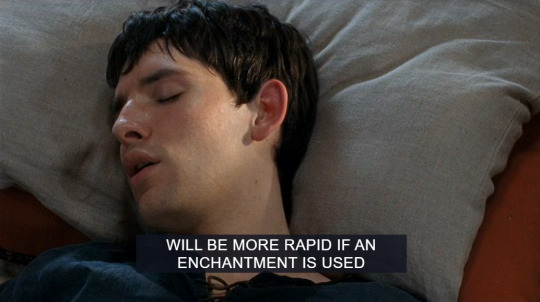
Magic Rule Established: Potions/Poisons can be more potent if magic is used in their preperation
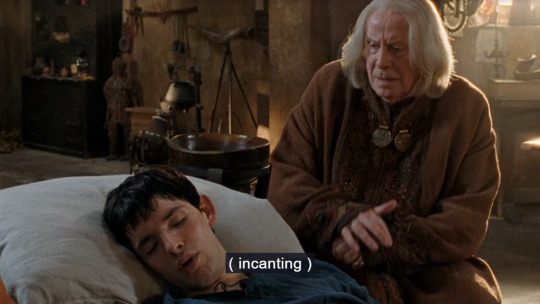
Okay MORE Beowolf
Merlin says Arthurs name then basically talks about a young man doing good deeds.
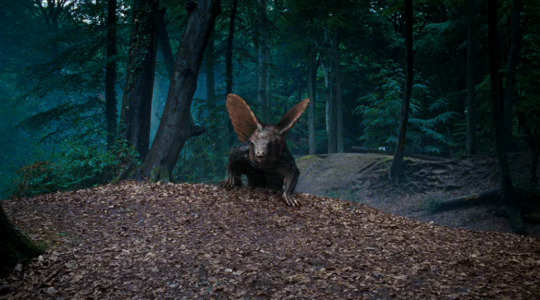
Playing hard and fast as I said. LOOK Dinosaur!
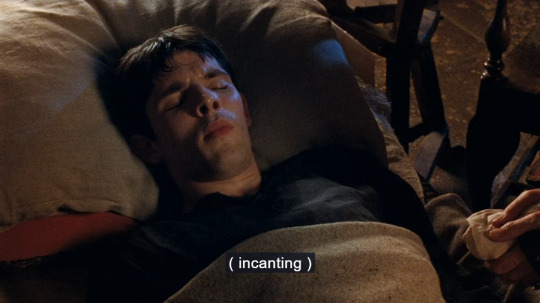
Okay so more Beowolf At this point I am 99.99% sure the people hired to write the spells at the time where having the time of their life. Let me explain
This line talks about gifts of treasure (the light) he conjuress to help Arthur. Fine. BUT then it mentions Arthur being under his father's protection. Expect Merlinto protectg him. The spell writers used a freaking old english poem to let Merlin call himself Arthur's "daddy" I am not sure what I am expected to do with this knowledge. (It might have been chosen so they could use the next line of the spell but THEY DID NOT HAVE TO DO THIS) The next line (Which is actually also the next line in the poem) says something about how so that when Arthur is older his companions can stand with him when war comes.
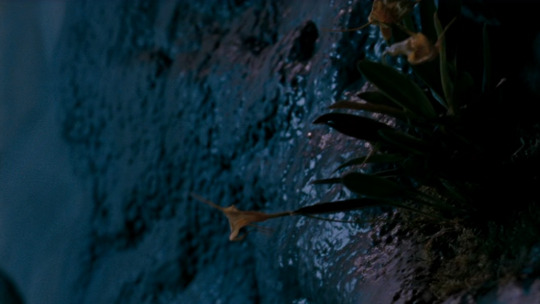
Okay so yeah turns out there is no tree or roots. I'm chalking this up to he said she said. STILL GOING WITH THE SORCERER.
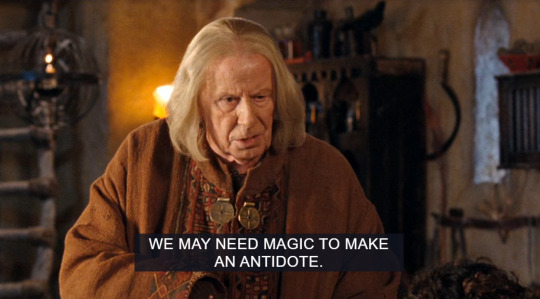
OKAY so it a potion is made using magic the antidote may ALSO need magic

Oh look our first hint Merlin is immortal. I find his brand of immortality intersting. HE CAN DIE he just comes back after a bit.
#lore#merlin lore#bbc merlin#merlin lorgasm rewatch#merlin lore rewatch#merlin rewatch#merlin bbc#merlin loregasm rewatch
44 notes
·
View notes
Text
so admittedly i did think it was a little bit random when they started calling the mutineers a coven but i've seen the light now so here are my thoughts on this kickstarted by this description of a common 19th century british witch archetype:
literary representations of witches would also be underpinned by popular tales recorded by folklore collectors in most parts of Britain, which portrayed such people as utterly wicked, possessed of all too effective magical powers, and ending up brutally punished by death or injury
— ronald hutton, "Witches and Cunning Folk in British Literature 1800–1940," p29
1. "utterly wicked." i mean. no justification needed for this one probably.
2. "possessed of all too effective magical powers." not directly, but hickey is weirdly unaffected by sickness and starvation and exposure and exhaustion compared to the others (a lot of his off-the-rails behaviors/mentalities later on do map on reasonably well to symptoms of lead poisoning and other things going on, but like, he isn't bleeding or losing teeth and i would sell my soul for my skin to look the way his does even during the very worst of everything, so). he also clearly has a lot of power over many of the men, in an understandable leadership way that is more reliant on charisma, bribery, planfulness, and situations than magic, but it does seem kind of magical at times
3. "ending up brutally punished by death or injury." hard to get more brutally punished than literal bodily bifurcation. the rest of the "coven" likewise meet brutal ends.
4. devil shenanigans. lots of focus during this time period in british lore on witches and devil worship. obviously the tuunbaq is not a or the devil and it is troubling to suggest as much (even in its role as a fabricated entity that does not actually belong to the culture it has been inserted into). nonetheless, it is presented fearsomely in a way that seems likely to be understood as demonic or hellish by a christian crew such as the men of terror and erebus (it might even be described as such canonically? i don't remember specific examples and i haven't checked). certainly everyone has a good christian "avoid that thing" reaction to the tuunbaq — everyone except hickey, who finds it appealing and sees an opportunity to seek power through it, much as folkloric and literary witches of the era were depicted as doing through the devil.
5. christian inversions and rejections. the mutiny arguably really kicks off with the murder of lt. irving, the most outspokenly christian person in the group. christ symbolism through the "punished as a boy" scene through framing and posture. as lt hodgson so kindly spells out for us, cannibalism and (catholic) communion both involve the consumption of human blood and flesh. at mutineer supper time i was briefly convinced they were about to say grace (totally subjective on that one but whatev). hickey going up the hill to listen to his thoughts was very prophet-like imagery. hickey's final speech rejects god and religion. probably there are more examples but i think that's enough for this post that is already longer than i planned for it to be.
6. sexuality part 1. witches of the time and place were associated with non-normative sexual practices (including homosexuality, promiscuity, femdom, sexual coersion, so on and so forth). hickey is directly depicted in a sexual and romantic relationship with another man (who is also the one who first suggested mutiny in the first place, solidifying the narrative importance of the connection between gay people and mutiny. be gay do crimes but for serious). idk what the stance in general fandom scholarship is about the hickey-tozer dynamic, but i would say that is plausibly depicted as at least being implied to be not 100% heterosexual, which is particularly notable because that has important potential effects on how the power structure of the mutineer camp works — a chaste rank-based collegiality has a very different vibe than a situation where the main guy in charge and his second in command might be fucking (or kissing, or holding each other's faces in a sort of tender pseudo-religious way, or whatever else they might have been getting up to together) — this is getting a bit off from witchcraft but certainly there are many comparable depictions of witches coercing powerful men to do their bidding by using sexuality (see my non-existent au i just thought of just now that's based on lewis's the monk, i guess???)
7. sexuality part 2. witches also were notorious for doing castration to people. sorry, irving.
8. sexuality part 3. perhaps most notably witches were regarded as having sexual relationships with the devil. none of the mutineers ever gets it on with the tuunbaq obviously (although i feel confident that some adventurous fic writers out there have probably made this a subject of their study), but it is KIND of attempted symbolically. i talked about this already but it bears repeating here that the tongue is an erogenous body part generally, and there is possibly some mild extra narrative emphasis on that symbolism for hickey specifically, so the metaphorical self-castration of him cutting out his own tongue and offering it to the tuunbaq is a little bit giving weird sex. it's also giving nun/priest/monk-like disavowal of the potential for (at least a few types of) sex with human beings in favor of pledging oneself to a deity.
9. human sacrifice. common trope with witches, and the clear point of hickey's dragging everybody up that hill with him when he goes also to attempt to sacrifice part of his own human self to the tuunbaq.
10. identity. this is a little less solid but there's often kind of a sense that witches aren't who they claim to be? see lewis's the monk again, with (spoilers, i guess) the character of monk rosario revealing himself actually to be matilda, a seductive witch, who eventually does a double reveal that she's a demon. the "i'm not really cornelius hickey" reveal is giving that, a bit.
#'sin must you always write SUCH long posts about devil things' YES i must!#the terror#cornelius hickey#terrorposting
17 notes
·
View notes
Text
DAMN. analysis (not beta read)
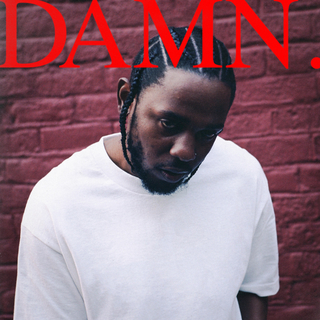
Hello. this is an analysis of one, or the darkest album from Kendrick Lamar. it goes into many themes of religion, guilt from religion, love, trauma, death, etc.
I'll start with BLOOD.
the first track.
it starts with "Is it wickedness" "It is weakness?" "You decide."
"Are we gonna live, or die?"
Wickedness - the quality of being morally evil or wrong
Weakness - a state or condition of lacking strength/a quality or feature seen as a disadvantage or fault
The back cover of DAMN. seems to represent wickedness. while the front, seems to represent weakness.
This actually, continues to be a theme throughout the album. each song stands for either wickedness or weakness. that last line, may not mean much, but it means so much after you fully understand it. you can interpret the song into whatever story you want, no matter what way it's played.
in BLOOD, it's a pretty short song, and it seems simple- but it bites you back In the ass when you relisten and understand the full album.
Kendrick helps an old blind woman who seems like shes lost something.
he decides to go over and help her, and says "Hello ma'am, can I be of any assistance? it seems to me like you have lost something. I would like to help you find it."
she replies, "Oh yes, you have lost something. you've lost, you're life."
and Kendrick gets shot and dies.
WOAH! right? You're like, what the hell is happening?
now, this may be some kind of metaphor, but, if it was a real encounter..
huh? kendrick is ALIVE? it seems super random, right? did the old woman shoot him, did a gang shoot him, did he shoot himself? whats going on?
To make sense, we have to go to the next song.
DNA.
In this song, Kendrick states 23 things that are inside his DNA. a strand of DNA contains 23 chromosomes.
he seems very confident on this track. too confident. so, why is Kendrick being murdered on the first track??
these are the 23 things he states are in his DNA -
loyalty
royalty
cocaine quarter piece
war
peace
power
poison
pain
joy
hustle
ambition
realness
kill shit
millions
riches
dark
evil
rot
troublesome heart
soldier
murder
money
sex
There are a lot of negative things in this, but there's a lot of good too.
this song seems to be more associated with wickedness, it even has evil in it, which is in the definition. the way he raps also seems aggressive, not weak.
onto the next track.
YAH.
in this, he seems tired, way more vulnerable, and weak.
this song visibly represents weakness.
Kendrick reflects on his fame. He's afraid he'll work himself to death, he's tired of the media saying shit. his radar is 'buzzing' and he becomes aware of how much his career affects him. he says he's tired of being gossiped about, on fox news, tv, interviews, etc.
when you see YAH, you'd think it's a abrv. for YEAH.
but, YAH is the name referring to the closest name to god. it fits, due to the religious themes.
another important line is -
"im not bout a' religion.
im an Israelite.
don't call me black no more"
He states he's not about 'a religion' although, this album contains themes about him BEING religious. seems confusing right? just like BLOOD.
He's not religious in any way, but he does call himself a Israelite.
in the bible, a Israelite are gods chosen people.
"these people with be cursed with confusion, frustration, and illness until they follow God's will."
so- what's this mean? we learn more In this album that, Israelites are all people of color.
his cousin carl, (theres a tape of a phone call in one track), that he believes that people of color are God's isrealites, and that they'll be cursed of all 'the bad shit happening'.
but, Kendrick, doesn't seem to care, he focuses more on his carreer.
that brings us to-
ELEMENT.
in element, it starts with "KUNG FU KENNY, AINT NOBODY PRAYING FOR ME." "GOD KNOWS WHAT HAPPENS ON EARTH STAYS ON EARTH." (kid capri)
lets go more into that last line. its a bit like, 'what happens in vegas stays in vegas', a term to promote for gambling, etc, saying that no one will know that you've done stuff if you do go there.
so if you take that in context, Kendrick realizes that :
nobody is praying for him, and that no matter what he does he'll end up damned in hell anyway.
he states he doesn't give a fuck about whats happening to him, and he says he would die for his career. this represents WICKEDNESS. you can hear it in his tone. he insults other rappers, and says he's the best rapper. its a response to his weakness in YAH, that he doesn't give a fuck that he's cursed.
see a pattern? weakness, wickedness, weakness, wickedness...
but then, Kendrick realizes.
he does give a fuck.
FEEL.
this starts off with,
"aint nobody praying for me." x3
this features one of his prouducers, VP, a female, named chelsea bylthe saying the same. this is to show that even in music, in his team, no ones loyal, no one truly cares.
this one visibly shifts to WEAKNESS. kendrick realizes...wait. what if I AM cursed. i DO give a fuck.
in element, kendrick hides in his rap career, to escape the fact he's 'cursed' or that he's 'damned'.
FEEL. lets out those feelings.
Kendrick feels like hes lonely, like no one truly cares, and that he's truly ALL ALONE, and that every in the industry is an enemy. he feels weak, so he fights back in this song to seem anything but that.
he still speaks about how hes the best rapper, but how its full of toxic people, showing weakness.
he starts to come with the fact that he might actually be cursed. 2 songs back, he was kind of mocking that.
LOYALTY.
This ones a short anyalisis. its a song about Kendrick trying to get people to pray for him, by having loyalty people by him.
people who he trusts, he needs loyalty.
but, this one shows weakness. the pattern breaks.
PRIDE.
this is considered the worst possible sin of the seven deadly sins.
pride makes you feel above everyone, even god.
this song is likely his post popular on the album, and its a very important song.
"Loves gonna get you killed. But Pride's gonna be the death of you and me..."
confusing, right?
but, you can notice, that Love will simply get you KILLED. pride will be the DEATH of you.
Death seems almost like it would be the end of you. the end of your soul, while love would simply kill you.
In this album, we can see how pride infects him throughout the song.
he states he cares more about his lyrics than others. he says that in another life, a perfect world, he was there.
maybe in that perfect universe, there is a Kendrick who cares about others- but he doubts there's a universe where he doesn't have pride like this.
this track shows weakness.
HUMBLE.
this is THE turning point in the album.
kendrick talks about trying to overcome his sin. pride, but, the fact that he cant help himself from throwing shots at other people.
this track shows wickedness, but almost accidental wickedness.
he wants to be vulnerable and get rid of pride, but he cant seem to do that.
Hes taking shots at other rappers or people, telling them to sit down and be humble.
almost like, "ill be humble, but you better sit down and do the same."
LUST.
this is another of the seven deadly sins. its considered as when sexual pleasure is isolated from the fact of making children.
its a very sexual song. infact, i never noticed how bad it is lol.
it tells the routine of a man/woman who only live for short kinds of pleasure, and wake up to do the same.
it also tells the story of how Kendrick has to change, but how he doesn't. he states he hasn't only been lusting over sex, but fame and money. he fears god now, because of his sins.
this song is the first time Kendrick talks about being afraid of being damned by god to hell.
he begins to be afraid of god in his healing process. he becomes more religious because he fears hell.
he drifts more toward weakness.
LOVE.
this is the oppisote of lust. he states his relationship with his wife.
but, he says he values loyalty more than love.
"ill rather you trust me than to love me."
going back to loyalty..
in the music video, a Kendrick in white gets choked and killed by a Kendrick in black.
they sort of reappear in LOVE.
the one is black is happy, in love, and in a happy relationship in the LOVE music video.
and the one in white is unhappy, and in a toxic, unhealthy relationship.
in love, you can see that he overcame he lust with love.
so..why is there a Kendrick in the music video, doing the COMPLETE opposite? he chose love in the end, right?
he overcomes his pride with humbleness and overcomes his lust with love. he lets go of his wickedness. right?
XXX.
it shows a poor understanding of America's problem. song talks about how young black kids in America will find a way to survive.
we get introduced to johnny, who doesnt want to go to school and wants to be a rapper like his uncle. (this may be keen, his younger cousin)
on a phone call, Kendrick says that if anyone touched his family he would kill that person and openly admit it- then, he quickly ends the call, saying he has to speak at a convection.
it talks about gun control, evil acts in America, etc, and how people turn a blind eye due to the American dream they're living.
kendrick talks about america like the complete opposite of a perfect world referred to in PRIDE.
XXX. could be the 'USA' X rated, but no ones exactly sure.
FEAR.
this starts with a voicemail from duckworth/carl, talking about how he knows that Kendrick feels like no one prays for him and he explains how they're cursed, and how it'll keep going until he follows gods wishes.
we get a verse from Kendrick sung backward.
random, right? but it actually means were going BACK in time.
he talks about when he was a kid, and his abusive mother. she threatened to beat him, and if he ran to his dad, she said she would hurt him more.
his father was the only one who could help him with his mother, and he really looked up to him.
the second verse takes place 10 years later. he was 17.
Kendrick mentions one fear: Death.
the lyrics speculate how he could die.
in 10 more years,
when he was 27, he has many more fears, saying that all the money and fame is a joke from god.
GOD.
God is a DIRECT response to fear, especially to the voicemail.
kendrick didn't want to feel cursed, so he turned to god, which to him, turns to weakness. vulnerable, that's how it seems to make him feel.
he says to god, don't judge me for my past mistakes. he says he was beaten, he did bad things..etc. he feels fear of god. its his way of asking god to not send him to hell.
he says he lives through fear. fear of god.
wickedness, or weakness? Which one?
weakness, right?
but, what if, he was never meant to choose?
YOU decide.
DUCKWORTH.
duckworth is the last track on the album.
he realizes that his biggest enemy was him, this whole time.
"i always thought it was me versus the world"
"until i realized its me versus me"
This is a story. a story of two men, one named ducky, one named anthony.
anthonys life turned into a life of crime. at 15, he was drug dealing, and continued in tih business. he gets approached by cops, gets offered to be a confidential comforter. he says no, and goes back to KFC to get something to eat.
Ducky worked the window and had a young son. he wanted to make money to get his son to college, but, obviously, he's not the only one who needs money, anthony does too.
ducky was aware, and he knew Anthony would. so, he got on his good side, gave me extra biscuits or extra chicken.
Anthony became fond of ducky, that he never robbed the KFC.
Ducky, is Kendricks father. kendrick was signed to anthonys label, and they met together, they laughed together.
because they realized that if ducky wasn't so kind to Anthony, Kendrick would have NEVER become a rapper.
WRAP UP.
to conclude.
you can play this album anyway. it can end, or start anyway. and it will still make sense.
if you play it backward, kendrick goes into a loop of crime, and died in blood, being shot after going into a life of crime after his dad dies from Anthony.
or, he can get better, closer to god, and be successful.
overall, this album was played out perfectly. and my hands hurt. thank you, bye.
THAT WRAPS UP, DAMN. THE ANALYSIS.

thank you.
#Spotify#kendrick lamar#damn#kendrick lamar damn#asks open#ask me anything#send me anons#anaylsis#kendrick lamar anayalsis#damn anaylsis#music analysis#media analysis#nerd#music#damn album#DAMN.#DAMN. album#LUST.#BLOOD.#PRIDE.#DNA.#FEEL.#YAH.#ELEMENT.#FEAR.#GOD.#XXX.#LOYALTY.#kendrick lamar duckworth#andywrites
12 notes
·
View notes
Text
Queer Religious Songs

I was interested to see the news that a song by the drag queen Flamy Grant was top of the iTunes Christian chart. I listened to the song and really like it.
There are many religious songs I like, but these queer ones speak to a part of me that the others don’t, they ask questions that are important.
1983 - Church of the Poison Mind : Culture Club - A religious gay man has found love, but because of what he was taught at church, can’t resolve his own feelings about being gay. The message is if you’re living in a culture distorted by prejudice, take a chance on joy–embrace love, whatever form it takes.
1987 - It’s a Sin : Pet Shop Boys - This song is about a person’s lifelong feelings of shame and guilt, presumably for being taught that being gay is a sin. For everything I long to do, no matter when or where or who, has one thing in common, too. It’s a, it’s a, it’s a, it’s a sin.
1988 - A Little Respect : Erasure - In this song the gay singer is calling to a lover not to leave and asks the question, what religion or reason could drive a man to forsake his lover? So often the religions we’re raised in are anti-queer and people have a tough time breaking from the prejudice when they have their first romantic relationship.
1991 - Losing My Religion : R.E.M. - Lead singer Michael Stipe had declined to address his sexuality, so when “Losing My Religion” came out, people assumed Stipe was coming out as gay. Consider this the hint of the century. Consider this the slip. It stands as a classic example of queer coding in the era of “don’t-ask-don’t-tell.” The song was interpreted as the struggle of a closeted gay man coming to terms with what his religion taught about gay people.
1992 - One : U2 - Bono explained that “It’s a father-and-son story. I tried to write about someone I knew who was coming out and was afraid to tell his father. It’s a religious father and son… I have a lot of gay friends, and I’ve seen them screwed up from unloving family situations, which just are completely anti-Christian. If we know anything about God, it’s that God is love.” Knowing it’s a gay son who is talking to his unaccepting dad, the lyrics really hit hard. Did I disappoint you or leave a bad taste in your mouth? And also these words from the chorus, We’re one but we’re not the same. Well we hurt each other then we do it again. It seems eventually the son decides to draw a boundary and remove his father from his life - I can’t keep holding on to what you got, 'cause all you got is hurt. I like that the lyrics say We get to carry each other, carry each other, we are different and may not agree on everything, but we choose to help each other, it’s asking us to find ways to have our relationship work even though we’re different.
1997 - You Have Been Loved : George Michael - George Michael wrote this song about Anselmo Feleppa, who died of an AIDS-related illness in 1993. While an intense song about grief and death, it also involves a spiritual struggle. Anselmo and his mother both say that God is not dead, George counters by challenging What’s the use in pressing palms, if you [God] won’t keep such love from harm? It’s a cruel world. You’ve so much to prove.
1997 - Together Again : Janet Jackson - The album notes say “I dedicate the song ‘Together Again’ to the friends I’ve lost to AIDS.” It’s a sweet song with hopeful words. Everywhere I go, every smile I see, I know you are there smilin’ back at me.
2011 - Born This Way : Lady Gaga - Many songs hint at queer identities and acceptance by using metaphors, but not this one, it is direct. No matter gay, straight, or bi, lesbian, transgender life, I’m on the right track, baby, I was born to survive. The song is a real celebration of who we each are made to be. God makes no mistakes.
2011 - We All Try : Frank Ocean - Frank Ocean sings of losing faith in mankind as the LGBTQIA+ community struggles to find acceptance. I believe that marriage isn’t between a man and woman, but between love and love, and I believe you when you say you’ve lost all faith, but you must believe in something. He reassures the listeners and the LGBTQIA+ community that I just don’t believe we’re wicked, I know that we sin but I do believe we try.
2012 - Same Love : Macklemore & Ryan Lewis feat. Mary Lambert - Macklemore sings against the homophobia taught at church. When I was in church, they taught me something else. If you preach hate at the service, those words aren't anointed and that Holy Water that you soak in is then poisoned. The song concludes with Mary singing I’m not crying on Sundays, which I think means not letting religious intolerance and churches harm us anymore, not subjecting ourselves to those words anymore.
2012 - Origin of Love : MIKA - Mika said this song “talks about my life, it talks about the church, it talks about falling in love and it talks about being happy and proud about falling in love with whoever you fall in love with, even if it’s a man. So in a way, this is my statement and my thank you to the man I love.“ To his partner he sings You are the sun and the light, you are the freedom I fight, God will do nothing to stop it.
Mika contrasts the goodness romance brings to his life with how the Bible introduces heterosexual relationships: Like stupid Adam and Eve, they found their love in a tree. God didn’t think they deserved it. He taught them hate, taught them pride, gave them a leaf, made them hide. Let’s push their stories aside. You know the origin is you.
2013 – Take Me to Church : Hozier - The lyrics are against church-fueled homophobia and persecution of queer people, and instead Hozier finds meaning by worshiping in the bedroom. Many queer people can identify with these lyrics: Every Sunday’s getting more bleak, a fresh poison each week. "We were born sick", you heard them say it. Hozier explained that churches undermine humanity as they teach shame about sexual orientation by saying that it is sinful or that it offends God. Hozier is an outspoken LGBTQ+ ally and the music video depicts two gay men being ripped apart by homophobic violence in Russia. It brought international attention to the anti-gay laws in Russia.
2015 - No Place in Heaven : MIKA - Mika is singing about how religion teaches there’s no place in heaven for gay people because the way we love is sinful. Father, won’t you forgive me for my sins? Father, if there’s a heaven let me in.
2016 - Son of a Preacher Man : Tom Goss - This 1968 song gets a gay update. The video tells the story of two gay teens struggling to understand their feelings for one another while operating within the confines of an evangelical church.
2016 - Trash : Tyler Glenn - In response to the Nov 2015 Policy of Exclusion by The Church of Jesus Christ of Latter-day Saints, Tyler created this video denouncing the Church’s restrictive view of same-sex relationships. The pain and anger are so raw in this video, it hurts to watch. These lyrics are an indictment, that he’d repent his days away if we wanted him to stay, but we throw him out like trash. If this is God’s church then there should be room for ALL God’s children.
2016 - Shameless : Tyler Glenn - The video has an old man in a black suit & white shirt tied up to a chair as Tyler sings You judge, but I don’t give a damn. I live a life so shameless. He lists things he does shamelessly now that once he would’ve been judged for: porn, one-night stands, alcohol. Tyler has now left the church and is not letting old men in suits make him feel shame.
2016 - G.D.M.M.L. Grls : Tyler Glenn - Despite the best efforts by this gay man to make church work, it didn’t because God Didn’t Make Me Like Girls.
2016 - Heaven : Troye Sivan feat. Betty Who - Troye sings candidly about what it’s like for a religious teenager to come out as gay. Without losing a piece of me, how do I get to heaven? Without changing a part of me, how do I get to heaven? All my time is wasted, feeling like my heart’s mistaken, oh, so if I’m losing a piece of me, maybe I don’t want heaven? Troye explains “When I first started to realise that I might be gay, I had to ask myself all these questions—these really really terrifying questions. Am I ever going to find someone? Am I ever going to be able to have a family? If there is a God, does that God hate? If there is a heaven, am I ever going to make it to heaven?” The video features footage from LGBTQ+ protests throughout history.
2016 - Sudden Death (OMG) : Tyler Glenn - In this song, Tyler expresses the initial shock of his faith crisis. I never asked to fall from grace. Catch me I’m starting to fall! Don’t know what all this is for! Keep comin’ at me with your disrespect. You went and started a war. Now I don’t care any more. I keep on living like it’s sudden death.
2016 - Devil : Tyler Glenn - A song that highlights the conflict between religious belief and queerness. I found myself when I lost my faith and not being able to pray the gay away. The constant in his world, what he’s anchoring himself to, is that his mom still loves him, and that’s important because studies show the acceptance & love of a parent makes a huge difference when someone comes out.
2016 - Queer Gospel : Erin McKeown - This song was written in response to the ongoing trend of "religious freedom" legislation being passed by some US states. Love us as we are. See us and we're holy. In this shall we shall ever be, wholly ourselves.
2016 - Midnight : Tyler Glenn - The Neon Trees frontman gives an emotional song about his departure from the Mormon church but not from God. The ballad is accompanied by a video that shows Glenn removing his religious garments and replacing them with a glittery jacket, which is such a powerful metaphor.
2017 - The Village : Wrabel - There are lyrics in this song of what religious people have told him, and boy do they hurt. They say, 'Don't dare, don't you even go there, cutting off your long hair. You do as you're told' Tell you, ‘Wake up, go put on your makeup, this is just a phase you're gonna outgrow.’ There’s a line in the song that hits me hard: One line in the Bible isn’t worth a life. The video is beautiful, very poignant, it breaks my heart and gives me hope.
2017 - Pray : Sam Smith - You won’t see Sam in church, but they say they’re a child of God at heart and they’re begging God to show them a way. I'm not a saint, I'm more of a sinner. I don't wanna lose, but I fear for the winners.
2017 - HIM : Sam Smith - This is a song about a boy in Mississippi coming out and the conflict between his sexuality and his religious upbringing. He is grappling with the feeling that there’s no place in church for him because he’s gay. The “Him” being sung is used both for God and for a boy he likes. Holy Father, we need to talk. I have a secret that I can't keep. I'm not the boy that you thought you wanted. Please don't get angry, have faith in me.
2018 - Explaining Jesus : Jordy Searcy - Jordy grew up playing music with his family and in his church. In 2014, Jordy landed a spot on NBC’s The Voice. In this song, Searcy is apologizing for how poorly we have been “Explaining Jesus” to others. He begins by singing If you're gay and over 85, you've felt for your whole life, that when God made you, he just messed up. The song ends with And I'm so sorry for all the wrongs. We're broken singers with broken songs. We paint our pride and call it truth. I'm sorry no one explained Jesus to you.
2019 - Hey Jesus : Trey Pearson - Trey made headlines in 2016 when, as the lead singer of the Christian rock band Everyday Sunday, he came out as gay. Three years later and Trey has a question: Hey Jesus can you hear me now? It’s been awhile since I came out, I was wonderin’ do you love me the same? As a person who struggles to reconcile faith with sexual orientation, I find this song quite moving.
2020 - God Loves Me Too : Brian Falduto - Brian played the gay kid in the movie School of Rock. Now as an adult, Brian is back and singing a song that no one has to earn God’s love. Brian wrote the song after visiting a church that was welcoming and accepting of queer people. I look around and see I’ve found a place where peace and love abound. I’ve waited my whole life for the truth. It is true, God loves you. It don’t matter if you’re LGBTQ.
2020 - Chasing Rainbows : Big Freedia feat. Kesha - Freedia is a gay Black man who carries a purse and uses “he” and “she” pronouns. Kesha is bi. Together they put out an uplifting song. Freedia lists the various ways she’s been put down throughout her life by schoolyard bullies, religious figures and record labels. Kesha makes clear we won’t be put down any longer when she sings You know me, bein’ free. Won’t be silent, I pray for my enemies.
2020 - Jesus Christ 2005 God Bless America : The 1975 - This song has Matty Healy pondering religious faith and love from his perspective as a queer person and describes hiding his sexual identity because of his religious beliefs. Phoebe Bridgers, who is bisexual, contributes a fragile and vulnerable verse. She sings of her love for the girl next door. Her love is unrequited as she is unable to reveal her true feelings to her neighbor.
2020 - Orphans of God : Ty Herndon & Kristin Chenoweth feat. Paul Cardall - The message of the song is that there are no orphans of God. We are all loved, we are all thought about, we are all created equally and God loves us all just the same. Ty Herndon is a country singer who came out as gay in 2014
2021 - I Know it Hurts : Paul Cardall & Tyler Glenn - This makes me think of a queer person coming to recognize their insecure place in church, how all those negative teachings were about you. I just wanted to believe, but how am I supposed to believe this about me? And then we find each other, queer believers who can understand what we’re going through, who know the hurt and the teachings and comments. For most queer people, they leave church and go on a different path. They’re not lost, a faint light at the end is guiding their way, they’re finding another way back home.
2021 - It’s a Sin : Elton John and Years & Years - This arrangement of the 1987 song by the Pet Shop Boys was recorded by the gay icons Elton John and Years & Years for the 2021 Brit Awards. The words are about a person’s lifelong feelings of shame and guilt for being taught that being gay is a sin.
2021 - Born this Way (The Country Road Version) : Orville Peck - For the 10th anniversary of this iconic song, gay singer Orville gives it a country music makeover
2022 - Good Day (feat. Derek Webb) : Flamy Grant - Matthew Blake was a worship leader for 22 years who has become a “shame-slaying, hip-swaying, singing-songwriting drag queen” named Flamy Grant. The lyrics talks of coming back to church after having left for feeling oppressed. They’ve come back to church because despite what some say, God’s love is expansive enough for everyone. God made me good in every way, so I raise my voice to celebrate a good day. This song hit #1 on the iTunes Christian chart.
2022 - If I Was Gay : Andreas Wijv - 29 year old Swedish singer and model Andreas Wijk wrote this song and debuted it in a TikTok video where he plays it for his parents as his way of coming out. It’s a vulnerable song that many will relate to. If I was gay would I be what they say, just a stereotype? If I was gay how do I get to heaven when there’s “no church in the wild”?
2023 - Faith : Semler - Grace Semler Baldridge performs by the name Semler and is genderqueer and nonbinary. Semler grew up with a dad who was a pastor in the Episcopal Church, and sings of how the rejection of their identity by the church left them scarred. When my religion turned against me, they said my hopes and dreams were faulty. I showed these holes inside my hands, and they claimed they couldn’t see. Even as they struggled with the church, Semler kept a relationship with Jesus and found they flourished far more than they did in church, and now the thought of going back to a church is unappealing. But I don’t wanna get small to be in those rooms. After singing about their religion turning against them, we hear the lyrics Our God is good and able, and our God is flipping tables at the mess of love we made a religion that often didn’t accept their identity. This song was released in June and before Pride month was over it reached the top of the iTunes Christian music chart.
2024 - Hell Together : David Archuleta - This is a song of David’s experience at church as a gay person: Bow your head, don’t be bold. You’ll survive by doin’ what you’re told. It became too much and he worries what his mom would think if he leaves the church: All I want is to make you proud. If I would run, would I let you down? In response, she replies: “If I have to live without you. I don’t wanna live forever in someone else’s heaven. So let 'em close the gates. Oh, if they don’t like the way you’re made, then they’re not any better. If Paradise is pressurе, oh, we’ll go to hell togethеr.” A beautiful story of a mom supporting her queer child. In response to his mom, he answers that he’s worried about what’s ahead but is confident to take those steps together: You and me, that’s all we need. Blood is thicker than the pages that they read. I’m afraid (I’m afraid) of letting go, of the version that I used to know. I’m not crying, you are.
58 notes
·
View notes
Note
now that you're 'officially' a rollo fan- do you have any recs for people writing for him? he's so new that i still struggle to find stuff haha
[Referencing this post!]
[If you can to read a sample of my own Rollo writing, please see this fic!]

After letting the full extent of Glorious Masquerade to simmer for a while (and working on some of my own Rollo fics in the background), here is what I’ve concluded of his character:
He speaks politely and eloquently. Rollo does not appear to be familiar with certain slang or fandom terms like “oshi”, and he has slightly more antiquated language. Additionally, he sometimes uses phrases that sound vaguely religious without actually talking about religion. For example, “salvation” is a big part of Masquerade, and Rollo speaks about magic as a sin that “tempts” people.
His general demeanor is calm and composed, but he also has a rigidity and a sternness to him. For example, Rollo holds no tolerance for those who commit immoral acts (such as theft) and is very blunt about calling people out for even thinking to do it.
While Rollo rarely lashes out, when he does it’s... intense. Lots of shouting, very defensive.
He is very punctual and diligent, but also self-righteous. Rollo will suggest that others act more accordingly to what he perceives as being “correct/just” (think like Riddle!) or he will take asides (with his handkerchief) to make express personal disgust or disapproval of certain behaviors.
Going hand-in-hand with self-righteousness, Rollo is stubborn and believes that he is in the right. He cannot bring himself to understand others’ point of views without falling into a state of confusion and guilt about himself. Therefore, he usually tends to deflect and project rather than reflect. Rollo also tends to think poorly of those who disagree with his vision, claiming they are “villains” or that their thoughts have been “poisoned”.
He has a savior complex, which Idia rightfully calls out as a product of Rollo’s own unacknowledged guilt.
As his mob students say, “[Rollo] is hard on others, and hard on himself”. (This is similar to Vil and the high standards he holds for both himself and for others.)
He has a great respect for the traditions and the culture of his homeland.
Rollo looks up to the Just Judge and seems to believe in the same “the ends justifies the means” mentality as the Just Judge.
Rollo has a high degree of pridefulness. He doesn’t accept pity from others and keeps his emotions to himself/writes in a diary about his thoughts rather than speaking to others about it.
He dislikes using magic for frivolous things like “having fun”. Therefore, Rollo himself would likely not do those things.
As a general rule of thumb, keep his past in mind. This will influence his current day behaviors. (Think of it like this: if you had a bad experience eating a certain food in the past, you’re more likely to avoid eating that same food in the present.) His trauma definitely still affects him to this day.
#twst#twisted wonderland#Rollo Flamme#disney twisted wonderland#spoilers#notes from the writing raven#advice#question
155 notes
·
View notes
Note
So you asked me to tell you about my oc and I hope it`s fine if do that here? Just delete this if you meant dm`s.
A little warning first! I can understand english perfectly but never had an opportunity to actually speak or write in it. Grammar will be wrong and sentences will be weird. I am trying my best :)
Her name is Cassiopeia and yes, it`s kind of pretencious, but it has a reason to be. Cassiopeia is from the island on the Grand Line that is living by the religion based on belief that every person has a star watching them and these stars can affect peoples lives. People from this island think of the Sun as a traitor who took away most of the humans to itself and are calling nonbelievers blinded. There is also a a belief that there should always be someone born "under the unlucky star" and that who Cassiopeia is.
What it means is that she is very respected but is treated horrbly. Almost no human contact, abuse from the church higher-ups, limited space for life and the only things she was allowed to learn are religious texts and some basic knowlege about healing herbs and stuff like that. She was also taught to "understand the stars" and she, by her own words, can find anyones star on the sky and translate what is has to say. Whether this is true or not is open to interpretation.
She was rescued from that life by a mink pirate and it is A LOT to tell, and I am really trying to not make this a massive infodump, so I`ll just skip to the result of Cassiopeia living on the tropical island closer to the begining of the Grand Line with the same mink and that mink`s child.
In the following years Cassiopeia was adapting to living like a normal person (and that was a ride on it`s own because her caretaker is a lot like Garp but a pirate and her methods in parenting are... unique. You can spot the wheapons inspired by chakram on the picture and let`s just say Cassiopeia can spill a lot of blood with those and is was a big part of her training)
Cassiopeia also used her chance to reflex on her beliefs and to learn about medicine and flora of the island she now lives in.
And it was proven to be useful when the Kid pirates stopped by and like... immediately got a big part of the crew horrbly poisoned by a local plant. Heat fot the worse of it. In that condition they where found by the mink and she, as a rude and sly person she is, struck them a deal: pirates help her with the local bandits that where causing trouble for some time now, and in return Cassiopeia will save the poisoned.
The next part I will mostly skip too. Just know that my girl was helping to fight the bandits and it was meant to show Kid that she can fight.
Cassiopeia held her part of the deal and helped the pirates bonding with them a little in a process. Since Heat was in the worst contition she spent extra time with him. He liked her talk about how she can "understand the stars" and gave her the nickname Cas.
After that the mink straight up asked Kid to take Cas with him (she was waiting for the opportunity huh) since he clearly needed a doctor anyway and "the girl have to see the world". It took some time and talk but this is how Cas ended up on Victoria Punk.
Cas is very different from your Doc. She does not have a degree and all the knowlege and experience that comes with it, so not the most competent for the job. She also a rather calm person who is (pre-timeskip) has a long way to go to come out of her shell. She lacks a lot of random basic social knowlege too, so sometimes her actions are not the usual way of doing things. For example when she fell in love with Killer, she had no idea that usually this feeling is not openly shown before the "love confession" and just started treating Killer with a lot of attention and owerall showing her feelings, while not putting any pressure to receive any kind of answer.
(Now that I am writing that I realized that your Doc`s personality is way more like another oc of mine where the idea that she is overworked accountant but her office is Onigashima and her horrible boss is Kaidou)
There is a lot more to say about her like her frienship with Heat, why her hair is so long and why it will be cut after the timeskip, how she will obtain Snow-Snow Fruit after Monet`s death and so on... But there is only so much bad text a person can handle and I feel like I am already pushing the limit so I will stop here.
Thanks for reading, here is scetch of pre-timeskip Cas, I promice to draw something for Hey doc later, bye!

Oh. My. Gosh.
Look at her. Cassiopeia is absolutely beautiful. I adore the time you took with the lore. The linking back to the unlucky star is just beautiful.
Makes me think about the constellation for Cassiopeia:

I love her personality of leaping first without thinking about the consequences: favouritism with Killer before the "Of course I'm in love with you." There's something so special in that. I also love the infodump. Learning about people's OCs feels to me like learning about characters in the series itself.
Also, just gonna put this out there, your art style is absolutely gorgeous. The expression, her body language, the way the clothes and accessories are draped, the weapons! I'm melting. I adore her and your plot is incredibly thought out and spectacular. I hope you post more about her!
10 notes
·
View notes
Text
On wembling, convincing, fawning, and the antichrist? A Convincing John deep dive.
I wrote this over the course of a week, trying to sort through 13 years of obsession. Why is Convincing John my favorite character, anyway? Content warning for talk of organized religion, a subject I try to stay neutral on. While my experiences with church are mostly negative, someone I know values it because of the community it gives him, while still criticizing the same things I do about organized religion. I'm trying to come to this with that point of view.
In 2011 I was out of college and employed on the weekends. There was a new channel on TV called The Hub. Essentially it was created by Hasbro to market its toys right into the brains of little kids with shows based on its properties, but it also had a number of reruns of old shit, particularly, including a big chunk of the Henson catalog. I think this is where my adult interest in Henson began. There were no muppets, of course, that was Disney, but there was a lot of the weirder, experimental stuff that no one talks about. Like Good Boy!. Does anyone remember Good Boy!(2003)? It’s a. It’s definitely a movie.
While other nerds my age were discovering My Little Pony: Friendship is Magic, I was watching Fraggle Rock in syndication. It immediately drew me in with its sets. Mossy caves with rainbow lighting were beautiful but also a little unnerving. Unknown creatures would bounce and slither in the background- nothing to do with the action, they were just there. It was contemplative and mysterious.
Then suddenly a girl was alone in a cage, singing about rivers and sunlight and her desire for freedom. That song had me totally enraptured. That’s the moment I became a lifelong Fraggle Rock fan.
youtube
I went on youtube and I looked up the song just to hear it again and to confirm that it was as good as I thought it was. Then I was down a rabbit hole watching more videos from the show and absorbing more songs.
And that’s how I first stumbled upon this rat preacher guy singing about human beings and doozer towers. Comments sections could not be turned off back then, and I scrolled down to see some weird comment about the character’s initials. Keep in mind that that particular upload has been deleted and the comment has been lost to the void, but it was something like this:
Convincing John is JC reversed, the reverse of Jesus Christ! Convincing John is the antichrist! Or at least that’s what those crazy 80s parents groups said about Jim Henson’s character back in the day. Those silly conservatives! But what if Jim had a message with this character? Makes you think, doesn’t it?
For the record, there is nothing to back that up. Not even anything about conservatives getting mad at the show for John’s character. I checked with the people who know. But, put a pin in that idea.
Mokey(AKA, the girl in the cage) was my favorite at first! I loved her singing voice, and I loved her complexity. Calm, but insecure. Generous, but vain. Pacifistic, but spiteful. Because she was my favorite, I wanted to see all the episodes about her, so naturally I learned the context of that Convincing John song.
And I tell you, the way Fraggle Rock introduced him was effective. For context, this is the episode where Mokey is trying to convince the fraggles to stop eating doozer towers. Frustrated that she can’t change their habits, Mokey declares that she’ll ask Convincing John for help, and when she mentions him, there’s a musical sting and her friends gasp.
The next two minutes are spent hyping up this character. “He can convince the rocks to change color” “he’s the type of fraggle no one goes to see”. We don’t even see Mokey talk to him, but we see what he’s done to her: he’s convinced her to wear plastic cups on her hands, and he’s convinced Red to walk around blindfolded. This is a fraggle, not a gorg or a poison cackler. He has the ability to make the girls make decisions that are clearly not in their best interest. Is getting him to change the will of their whole community really a good idea? It feels like making a deal with the devil. Even Mokey calling him a ‘nice man’ makes him seem more ominous.
youtube
If he has that kind of power, what kind of person is he? I mean, yeah, I’d already seen the song, but putting myself in the shoes of someone watching this chronologically. Two thirds of the episode in and he finally shows up, and he’s just about the ugliest fraggle you’ve ever met! I mean that affectionately. He has a cheap suit, and teeth! Teeth built right onto the puppet! They resemble that time Kermit had teeth but not quite as bad. He proceeds to sing his very upbeat, very silly song, which does indeed change everyone’s minds.


John was played by Jim Henson himself, along with Cantus the minstrel, and they were very much based on the facets of his personality- the hippie and the salesman.
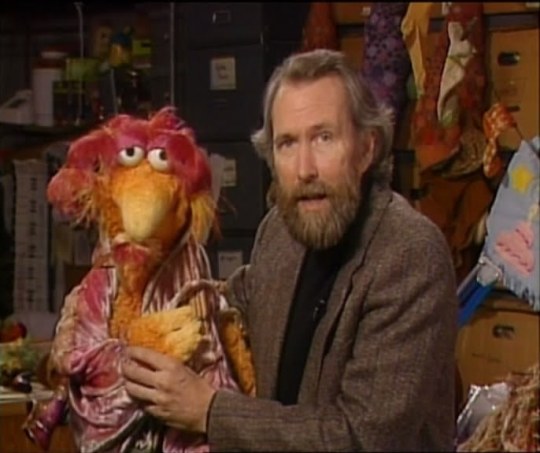
In The Preachification of Convincing John, John himself is more of a force than a character. We, the audience, always see him when he’s performing, even though we know Mokey talks to him in more private moments. That would change in season 2, episode 14, The Secret of Convincing John.
When his name is brought up, it’s only Boober who seems to display the same amount of fear as he inspired in Preachification. Gobo sounds in awe of the man, but he has other things to take care of. Boober is dreading the experience, and asks Wembley along, but Wembley already made other plans with Gobo. We’ll later see that it was Red who summoned him to make her community wear clown noses, and Mokey is along for the ride. I have to say, of all the fraggles, I’m most surprised that Mokey has not learned her lesson about John.
youtube
But then again, this showing seems to have lower stakes. The Clown Concierto is a party song, and John will only be singing one verse. The Fragglettes exposit that one verse makes for a temporary convincing, ‘perfect for pajama parties’. So this is kind of like a temporary, group hypnosis. Mokey seems enamored with the idea of ‘wearing the nose, and believing in it’.
When Wembley sees Boober, of all people, wearing a clown nose, he resolves to have Convincing John convince him to stop wembling, and this is where the danger comes back to the situation. Making people wear clown noses for a pajama party is one thing, but changing your personality? So it seems like the fraggles fear isn’t so much for John himself but the way he uses his powers.
When the Fragglettes speak to Wembley, they once again bring up the number of verses. One verse will make him a little confident, two verses will make him totally confident in public but still have doubts in private, and three verses will make him arrogant. But the choice doesn’t matter to Wembley because, in true Wembley fashion, he does not choose the treatment for himself. But this time it’s not his fault: Convincing John leaps in and starts singing over him.
youtube
John gets through two verses before Wembley stops him and the Fragglettes, and rather rudely, too. Now his voice is brassier. He says he doesn’t need John’s services anymore. When he returns to his friends, he informs them he changed his name, and starts ordering them around. He’s so definite that his friends dislike him and they think he’s going to hurt himself. It seems John’s convincing worked VERY well on him. Put in a pin in that, also.
His friends force Wembley to see John again to reverse the damage, but this is where the secret comes in. Because they catch John in the middle of a song- a song about his own wembling! It seems John’s choice paralysis is even worse than Wembley’s. And honestly? This is the moment John became my favorite rock character. These twenty minutes of television changed the course of my life forever.
youtube
Gobo and the others are surprised by this, naturally. John says that wembling is the secret to his success, although the way he delivers it it sounds like bullshitting. But I tend to think that there’s something to that!
Let’s look at Fraggle Rock: Back to the Rock, Season 1, episode 10, Wembley the Spokesfraggle. The doozers make towers using a material that tastes horrible to the fraggles, and they simply aren’t touching them. An advertising specialist named Jack Hammer says they need a spokesfraggle for their cause, and when he sees Wembling wembling, he chooses him. Wembley goes to become, dare I say it, very convincing as he sings the praises of the weird, pink sticks. It could very much be that Jack sees Wembley as someone easy to mold, but Wembley really does become a good spokesfraggle.
This arc very much feels like a shoutout to Convincing John. Wembley gets a tie and three backup singers to go with his new role. His friends even deny that someone as charismatic as he has become could still be a wembler. Remind you of anyone? I also love that this is about people to convince people to eat the towers instead of to stop eating them.
youtube
So here’s where I get into my theory. I feel like wemblers are just sort of, kind of different fraggles. They are easier to convince, at least initially. In The Secret of Convincing John, Wembley became a jerk after only two verses of John’s song- something that was not meant to happen. In the Wembley the Spokesfraggle universe, Wembley was easily molded into what Jack Hammer wanted him to be. But as soon as Cotterpin told him what the fraggles were really doing with the sticks, he had his doubts.
You might ask for an example of it happening for John, and I would argue that every time we’ve seen John so far he’s been susceptible. You’ll notice, we haven’t seen him so ‘no’ to a convincing job, no matter how disastrous the results might be. More on that, later.
So Wemblers are easily swayed, but they are also particularly compelling speakers. Now, I do have to mention that in Wembley the Spokesfraggle, people seem to particularly trust him because of his reputation. He’s known for his honesty and the careful way he goes about decisions. When he starts telling fraggles that the pink sticks are good, actually, its *themselves* that they doubt.
But John doesn’t have an honest reputation- quite the opposite, actually! Fraggles are afraid of him because of what they know he can do to them. John’s convincing feels like some kind of spell, and the way they talk about the number of verses affecting the effectiveness makes it feel moreso. Even the convinced fraggles express confusion over why they did the things John convinced them to do.
So yeah, I totally believe wembling is the secret to John’s success, even if he doesn’t. Now lets examine how his powers work.
First of all, his convincing can cross the species boundary. Wembley encountered several doozers wearing clown noses on his way to see John. Tests would have to be run to see if he could convince gorgs and silly creatures.
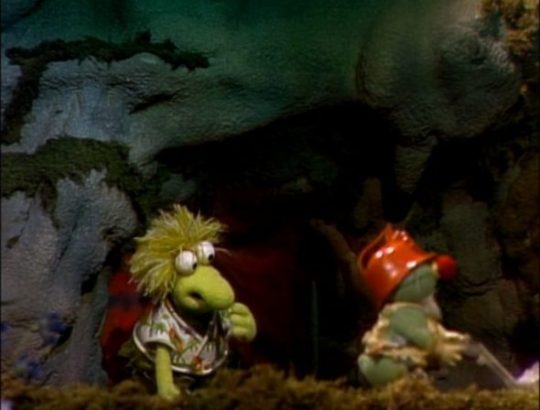
When Wembley returned to his friends, they were no longer wearing the noses. The Clown Concerto was temporary, just as the Fragglettes promised. So, if John sings one verse, it just wears off on its own. I think we can conclude that the song he sang to Mokey about cups on her hands only had one verse, then, as she no longer wears the cups a few days later.
So, three verses must be very potent, right? In Preachification, the fraggles got three verses. They pressure Mokey to let them out of the solemn oath. She eventually does, but you’ll notice that they don’t touch the towers until John sings another verse. It makes me wonder if they needed his spellbinding song in order to eat them again. What would have happened if he hadn’t shown up? Would they be able to eat the towers? Or would they find themselves compelled not to do it, despite their own desires? No wonder the fraggles are afraid of John.
So only one verse of the song to break the three-verse spell, and to break a two-verse spell requires a challenge. Maybe. Perhaps Wembley's nature as a wembler means John needed to try harder or use a softer touch to break the spell.
And sure, we don’t know. Wembley might have come to his senses on his own, eventually, and maybe the fraggles really did only need for Mokey to release them from their oath. But giving John all this power- its just a fun headcanon! So that’s the one I choose.
The third thing we know about John’s powers is that they do not seem to work on himself. Despite lamenting about his own wembling in song form, John has not convinced himself into being a definite fraggle. Not as far as we know, anyway. Even more concrete evidence was the fact that he bit into a tower right before singing a reprise of his anti-tower song.
Now I understand why some random youtube commenter called him the antichrist. Convincing John has this much power, so he must be evil. But is he really? In a show like fraggle rock, where empathy and cooperation is the key, is there really any room for evil characters?
I honestly feel like John is just a guy who loves doing what he does, and he believes that he is really helping people. We also don’t see him say ‘no’ to any convincing jobs, even if they could spell disaster for his home. Is it ever his sole idea to convince someone? Well, he wasn’t told to convince Mokey to wear cups on her hands. Or was he? We don’t see the scene play out. The girls were also there, and likely so were the Fragglettes as it’s established they live together. So the idea could have come from any of them.
Makes one wonder what would happen if Marlon or Pa Gorg asked for John’s help. He kind of comes across more as a people pleaser than this plotting manipulator. And, maybe there’s something to that?
Let's talk about Wembey for a minute. He displays traits of fawners. In Back to the Rock, season 1, Episode 4, Four Wembleys and a Birthday, Wembley begrudgingly agrees to all of his friends’ ideas for how to spend his birthday, even though he doesn’t want to do any of one of those activities. He even justifies it by saying “But, as long as my friends are happy, maybe that’s enough.”
Wembling’s fawning is especially evident in Fraggle Rock season 1, episode 2, Wembley and the Gorgs. It’s foreshadowed when he’s especially agreeable to Gobo’s suggestions. “If it’s OK with you, it’s OK with me” is a repeated mantra. With the gorgs, his interactions are kind of the literal definition of fawning as a defense mechanism in action. Wembley is in a dangerous situation with people who want to hurt him, and there’s no way he can escape. So when Pa Gorg says he wants to be saluted, Wembley agrees with no question.
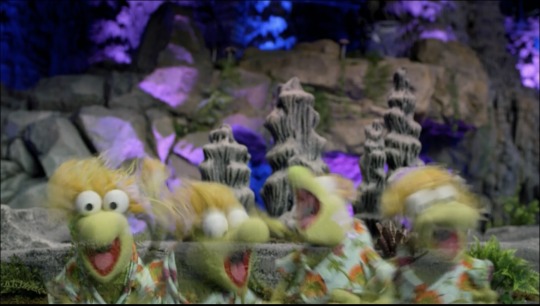
In Four Wembleys and a Birthday, Wembley actually pulled himself so thin that he split and became invisible. Indeed, when you fawn, you can lose your identity. Your whole existence is about other people, not yourself. After the events of the Wembley and the Gorgs, he reflects on his experiences. “I mean, it didn’t seem like I was a slave. I guess some slavery feels like freedom.”
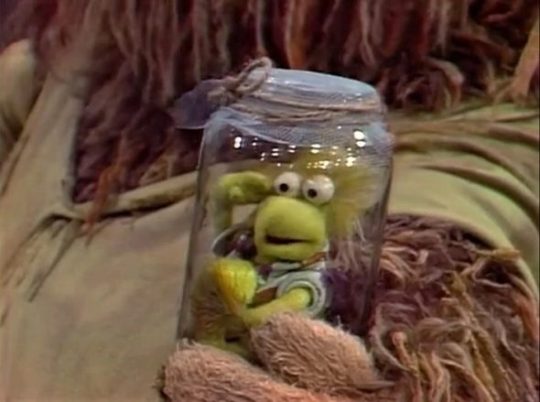
And that's another thing about fawning- it's still your idea. Wembley saluted Pa, his whole heart was in it. There was no part of his brain that was consciously thinking “I’m doing this so that he won’t hurt me.” It was not a conscious decision, even though it was still his idea. It’s kind of hard to explain but when you fawn, you really are totally in it. For the moment, you totally believe whatever it is you’re agreeing to.
There’s a misconception that fawners are manipulators because of the way we seem to change our minds so quickly, or even because we say ‘what people want to hear’. As if we’re politicians, not just regular people navigating our own lives. I promise you, we aren’t out to lie to and manipulate you. We are constantly operating under a fear protocol and when the fear becomes too much, our brains default to the behaviors that kept us safe when we were children. It harms us more than it harms you, and it takes a very long time to unlearn the fawn response.
Fawners also tend to be fawners because they learned that it kept them safe. They often grew up in situations where they could not always get away from danger, and appeasing their abusers was what they needed to do to survive. I think it’s possible that Wembley was in an unsafe situation before he met his friends. But with their support, he’s learning to say ‘no’ more and more, and especially when its important. Most of his arcs are about finding his voice. In Four Wembleys and a Birthday, he does manage to recombobulate and he tells his friends what he really wants.
I propose that John is a fawner, too, but it's better at hiding his low self confidence. He is a performer, after all. And he makes a good foil to Wembley. Even his purple fur is a nice foil to Wembley's yellowish coat. John is mirror of what might have happened to Wembley if he hadn’t met supportive friends. If he had met Jack Hammer before and continued down the path of a spokesfraggle. Wembley is a fraggle with a lot of inner strength, but without power. John is a fraggle with a lot of power, but without strength.
To some things, Wembley agrees full heartedly. Like in The Secret of Convincing John, when Boober asked him to join him for the Clown Concierto. The only reason he didn’t go is because Gobo reminded him that he had previously committed to helping Gobo get his uncle’s postcard from outer space.
But he doesn’t always jump on everyone’s suggestions. There are times when it’s clear that Wembley does not want to say yes, but he struggles with saying no. So he kind of stalls, saying things like “Oh wow Gobo, you think so? Huh, maybe we could try that?” Even when he does tell people in a direct way that he doesn’t want to do something, it takes him a long time to get there. An example of this is Fraggle Rock: Back to the Rock, Season 1, Episode 2, Red and the Big Jump.
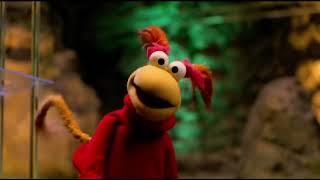
(A brief aside but- hello- Red and the Big Jump is *brilliant*. Not all of the responsibility should be on Wembley to always speak up, it should be on his friends to listen, too. John Tartaglia, who wrote this one, understood that perfectly. As you can probably tell, Wembley is the member of the Five I identify with the most, and I’m so glad he was the catalyst for the episode about consent. People aren’t always able to just say no. The Trash Heap makes it clear that the absence of the ‘no’ is not a ‘yes’. That’s a message that even adults seem to have a hard time understanding, which is why it’s so, so important we teach our kids these things from a young age. I’m so glad Red and the Big Jump exists.)
I believe that John has his own way of stalling to avoid saying no. We didn’t see it, but we did see the results of it. Mokey with cups on her hands, and Red wearing a blindfold. He’ll convince people to do silly things instead of giving them a direct ‘no’. He initially did this with Mokey, but only got through one verse before she convinced him.
So was that youtube person way back then correct? Is he the fraggle antichrist? I mean well. No. Not at all. But. Being generous, I think there is something interesting to be said about John and religion. Because I left something out when I talked about his inspiration- he’s a reference to Jim’s personality, but he’s modeled after televangelists. He’s got the bad hair, the flashy suit, and the backup singers, and his debut episode is even titled the Preachification of Convincing John.
Even the language his song in that episode echoes some phrases you might hear from a preacher on TV. “There’s a mighty day a-coming”, “extra-good-as-gold”, “for eternity”. It’s very interesting to me that in this version, the reasons John gives all have to do with the fraggles’ well-being and not the well-being of the doozers, as this Mokey prime concern. As a preacher, his strategy seems to be ‘scare-em-straight’. It’s not about what the doozers need; it’s about how horrible things will happen to the fraggles themselves if they eat the towers. This is also a hallmark of bad actors in these fields who rely on the fear of damnation rather the love of one’s fellow human beings to compel their flocks to act.
Convincing John features in one last episode, The Secret Society of the Poohbahs. In the story, Mokey seeks to gain entrance into an “Exalted, high, holy, order”. She becomes very stressed out as she believes she’s breaking the rules of the club, but eventually realizes that it’s all very silly. By design!
John is one of the leading members of the club, and at one point he states that he doesn’t know what ‘innocent’ means. “Doesn’t it have something to do with lambs?” That feels like a vague Bible reference. Honestly, the Poohbahs could easily be fitted into some commentary about religion. A group of people with their strange rituals who are quite scary but when you look close, they’re just your friends and neighbors.
So, it may not have been intentional, two out of three of John’s appearances had elements that were poking fun at organized religion in a tongue in cheek way. Like everything on Fraggle Rock, it paints a nuanced picture. It’s wrong to scare people to the ‘right’ path, and don’t get so hung up on scripture. Church is meant to be about community, and if it loses that in rituals and rules, then its not right. It’s a light in a tunnel. In a world where kids might have had a preacher tell them they were going to hell if they kissed certain people, this must be a breath of fresh air.
So why do I love John so much? He reminds me of me. He’s a fawner. He wants to be liked, but the way he goes about is probably not the best, and it leads him to being feared. And John is full of other contradictions. The ugliest fraggle in the rock, but the most charismatic as well. Outwardly confident but inwardly unsure. Powerful but easily swayed. As much a snake oil salesman as he is a preacher. Not good or evil, but certainly flawed. A complex, well rounded character, in other words, who I would love to know more about.
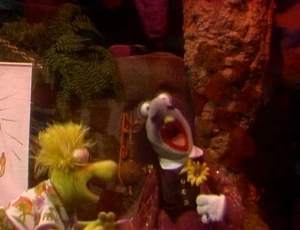
Scratch that. It’s the teeth. It’s definitely the teeth.
#this was longer but cut a lot out and put it in a different post#convincing john fraggle#Wembley Fraggle#I talked about him more than John lol#fraggle rock#fraggle rock: Back to the rock#the preachification of convincing john#the secret of convincing john#Wembley the spokesfraggle#four Wembley's and a birthday#Wembley and the gorgs#red and the big jump#sunlight and shadow#convincing john (song)#the clown concerto#a terror and a tiger#doozer stick jingle#I hope the songs kept you entertained lol
5 notes
·
View notes
Text
Idolization in Demons by Dostoevsky
I've noticed another line with Biblical subtext in Demons. We can see how the phenomenon of idolization aggravates with every further generation:
• Varvara Petrovna idolizes Stepan Trofimovich; in the beginning of the novel she thinks about him as a perfection, "a dream", she believes in his judgements and abilities. Yet, Varvara Petrovna often argue with Stepan Trofimovich; she probably has more power over him, than he over her.
• It is pretty obvious with Pyotr Stepanovich and Nikolai Vsevolodovich: a fervent monologue with all "you are my idol/sun/Columbus, etc." speaks volumes. It is an obsession, almost madness; Pyotr creates the whole plan of the revolution around Nikolai. And yet, Stavrogin's rejection would not have stopped Verkhovensky from realisation of his ideas. For him, revolution is dearer than Nikolai, than anything in the world.
• And last but not least is young Erkel. He doesn't have his own idea: his idea is Pyotr Stepanovich, the embodiment of superior purpose (in Erkel's opinion, of course). There is absolute submission to the idol.
Back to Biblical references, lots of idols, i. e. pagan deities, became demons in Christian religion. So Nikolai, Pyotr and Erkel are definitely "demons" in the novel; but Stepan Trofimovich can be called a political demon too, as, according to Dostoevsky, liberalism of 1840th produced radicalism of 1860th (he is literally Pyotr's father).
I think it is another way for Dostoevsky to demonstrate that false ideas (and false gods) poison society and turn people away from the true God. From day to day it keeps getting worse. The novel is a warning that this tendency should be supressed - otherwise, false gods would lead the country to a catastrophe (maybe even the Apocalypse).
For short: you shall not make for yourself an idol
P. S. Dostoevsky was right, political catastrophe happened after half of a century: he literally predicted the Revolution of 1917
#demons#the possessed#dostoevksy#russian literature#classic literature#biblical references#literature#the devils
15 notes
·
View notes
Text
Careuul and Q'ari sit in the canteen during midday break chatting and drinking some herbal tea. The Humans introduced the drink and the meal. They call it 'Lunch' and while only the Humans need the meal, the break and the tea has proven to be a big hit among the other sapients on the starbase...so long as they stay away from the poisonous ones. There are a lot of poisonous ones. Most everyone can have chamomile though. "Did you know that the Humans a whole thing about being nice to visitors? It’s called hospitality and they have practically an entire religion about it!"
"What? They have a religion about being nice to people you meet?" "Pretty much! My guess is that living on a Deathworld is so hard that they just felt obligated to help people who were passing through their village or peer group or whatever. The idea was that no matter who shows up - even their enemy - you give them a meal and a bath and let them have a nap and point them towards where they need to go if they're lost." Careuul took another sip of tea "You weren't even supposed to ask them questions about who they were or what they were doing!" Q'ari was baffled. "But that makes no sense! What if the person was going to hurt you or your group? You had no way of knowing."
"Yes, but the idea is the next time it was you traveling, you'd get help from others too." Nancy said from behind them. Q'ari and Careuul's fur bristled and they both recoiled in surprise and slid their chairs back to jump away before stopping themselves and sitting down, tea spilled everywhere. Predator/Prey reactions were deeply ingrained in the K'laxi and Humans were exceptionally good predators, even when they didn't mean to be. "Sorry! Sorry!" Nancy said, seeing their reaction. "I didn't mean to startle you! I just heard you talking about hospitality. People everywhere don't treat it like the religion it used to be, but it's still a common thing that people do. Here -" she said gesturing on her pad "Let me buy you both another Tea to say sorry for spilling yours. Chamomile, right? I feel so badly about startling you, what are you both doing for dinner? Come eat with us, please!"
398 notes
·
View notes
Text
It's an interesting thing that Rakha has now spent quite a bit of time in several different religious structures - the ruined temple of Selune, the overgrown, gith-hijacked monastery of Lathander, and now the shattered Sharran fortress.

And all of them have been places that are falling apart, broken, corrupted of their original purpose.
Rakha hears her companions speak a lot of religion. Gale is willing to blow himself up for Mystra. Shadowheart centers her life around Shar even while the goddess strikes at her regularly. Vlaakith was Lae'zel's only purpose until it all fell apart. Even Wyll sometimes speaks of the Triad. Religion is clearly very important to a lot of people.
But Rakha doesn't understand it. If she ever followed a god, she has no memory of it. And she can't recall any place of worship that was not cracking at the seams.
As such, she's not overly impressed with anything they find at Grymforge. The architecture is imposing, certainly - and she can see an interesting new tenor to the way the Weave works here, perhaps touched by some particular element of divine magic she isn't familiar with. But the dwarves have taken it over fully; there's nothing here other than rubble and corruption. If they're lucky, it is a route to Moonrise, nothing more.
She does keep her eyes and ears open as they walk through it, though, hoping to pick up any useful information about the Absolutists that might help them in the fight to come. Because there will be a fight. She will destroy this cult at the roots.
Initial data gathering and other shenanigans:
The duergar group is called "Clan Flameshade" and has been capturing local drow spies and making examples of them.
The duergar keep spiders for combat. They're either not well-trained or bred for violence even towards each other, because she watches three of them tear apart a larger one together.
Many of the other dwarves echo the welcoming committee in their disrespect for the True Souls, the Absolutists, and Nere. They're still arseholes, though, as Rakha quickly discovers - particularly in their attitude towards their slaves. (She and her companions briefly discuss trying to ally with the duergar against the Absolutists, but Rakha pretty stubbornly doesn't want to; she dislikes everyone in this place.)
The exception here seems to be the sergeant, a woman named Thrinn, who is (at least based on the comments she overhears) fucking Nere or would like to.
Entertained by this Dark Urge line option when talking to one of the gnome slaves, after he mouthed off at her because he thinks she's another True Soul:

She doesn't really care what the gnome thinks of her but I did have her say this - more for Wyll to hear her say it than anything else.
There's a cask of ale which the slave is using to fill the mugs of the nearby duergar. After some consideration, Rakha - still avoiding combat for the moment at Wyll's request - did dump a container of wyvern poison into it when no one was looking.

She then hung around to watch the next round get served.

The fortress itself has plenty of hidden passageways and alcoves. Rakha and co. are able to find a hidden room full of smokepowder, which Rakha immediately pockets. She remembers how useful it was in dealing with True Soul Gut.
Shadowheart occasionally pipes up with commentary about the Shar worship that used to happen here. Rakha tries to gauge how she feels about seeing the place overrun by duergar, but if she has an opinion, she's not sharing it.
Rakha gets almost completely obliterated in a single turn by the jelly fight in a random sideroom - not because the jellies hit her at all, but because of this wild magic surge. XD

10 notes
·
View notes
Text
Sci-fi and Fantasy are linked in a strange way. Both deal with impossible premises and both typically have what we call "magic" but we don't normally call Sci-fi shenanigans magic, unless they are strictly spiritual. Sci-fi approaches the impossible as if it's simply not possible yet, and that this world has made a break through, allowing them to make this possible. Sci-fi also tends to spend a lot more time explaining how something works with science, or a modified version, while Fantasy explains it through the supernatural and mysticism.
Obviously no series in either category perfectly follows these rules. The cosmere explains that the supernatural is actually natural and measurable, therefore spiritualism is just another part of science. Star wars in my opinion does the opposite. It takes place in a society with future technology and all the trappings of Sci-fi, but it does it in a very fantasy way. Lightsabers are I think the best example, why would you ever need a sword when everyone else has laser guns, because cool fantasy that's why, it's a laser sword. The futuristic elements are portrayed with a mystic elements. And of course there is magic, they try to make is sciency later by explaining that the force is medicorians or whatever, but it still operates on a spiritual and mystical level, and truly isn't completely comprehensible. Which is in contrast to the Cosmere where all the mystical elements just feel like science that hasn't been explained yet.
Dune is where it gets a little weird to me. I think most people would put this in the hard Sci-fi camp, but I disagree. Yes this series is to Sci-fi what Lord of the Rings is to Fantasy, but I think there's a lot of Fantasy in there. I mean the voice? That's magic, Bene Gesseret being able to transmute substances in their body including poison? Magic. Prescience? It comes from a magic drug, made by magic worms! Yes the books do try to approach this from a very sciency way, but a lot of it just feels like magic, no matter how much Herbert tries to make it scientific. (Btw Sanderson's favorite book series other than the Wheel of Time is Dune, so you can definitely see a lot of his inspirations in this, in fact Taldain, the setting of white sands, is definitely just Cosmere Arrakis, like it even has its own version of sand trout.) There's also a shit ton of mysticism in Dune, and yes much of it is discussing the manufactured nature of religion and aspects of spirituality to control the masses, but there is also a sense that not all of it is made up, that the people in power are manipulating truth without really knowing what it is, just so they can get ahead and stay that way.
Obviously genre, especially in books are really just marketing terms designed to help find the right audience for a particular story. This is the same with YA. YA is an even less concrete genre as it requires very little. Mistborn was not originally marked as YA, it's an epic high fantasy, but after a couple years the boys at TOR figured out that it has a lot of the trappings of YA. It's fast paced, has a young strong female protagonist, a dark dystopian setting, and is written in pros that don't require an incredibly dense knowledge of vocabulary, making it easy to comprehend for all ages. It was a no-brainer for Tor to start printing a YA version(just a paperback with a different cover that is stylized in a way that is very common for YA). YA really just means a teenager could read this without feeling like it's homework. That's really it. There are a lot of people who hate YA for incredibly weird reasons. I personally am weary of YA, simply because I enjoy a slower plot with more room for nuance and sitting in the moment. YA tends to be more fast paced, which I enjoy, but it often comes at the cost of depth. There are a lot of YA books that I enjoy and a lot that I would enjoy if they were written to be a little more "boring". But some of y'all really just don't wanna read anything that is labeled as YA, and I'm positive it is just misogyny. Like y'all just don't wanna read books that are popular and "primarily" marketed towards women, and it's really, really pathetic.
I don't know how this turned into what it is, and I don't have a final point to end this on that will tie it all together. Enjoy this ADHD clusterfuck of a post where none of my points are truly taken to completion
I do not know how to end this, I just wanted to talk about it
#fanatsy#cosmere#dnd#brandon sanderson#scifi#publishing#star wars#dune#i really should get back on my meds
12 notes
·
View notes
Text
So like, the kaiju cultists of Pacific Rim interest me quite a lot, because religions and cults and all that are things that interest me. I need you to understand this first and foremost.
Because.
*deep breath*
*sobs*
The kaiju prayer in the novelization is. Um.
Well...
It's complete and utter nonsense. Total garble. Completely incoherent.
What do I mean? Well...
So, here's the kaiju prayer written by Alex Irvine for the Pacific Rim novelization:
We are the sisters of the kaiju.
We open our arms to receive the angels of the ocean.
Majestic creatures from beyond our horizons, deliver us from suffering and strike the evil from our hearts.
You are mercenaries on a mission of mercy, come to free humanity from a poisoned home. With almighty powers, you stir our oceans and steal our skies.
O kaiju kings, lead us down into your paradise below the seas and vanquish all who oppose your supreme reign.
Look how you crucify our false prophets, man-made tyrants who fear what they do not understand. You are not the scourge. You are the salvation.
We fall to our knees in your infinite shadow and raise our hands in awe and admiration.
Let the blue blood of the archangels wash away our iniquity that we may start life anew in the world before…
On a broad level, this aligns with Travis Beacham's statement about BuenaKai following an apocalyptic theology and believing the kaiju are here to wash our sins away.
But when you look closer, you can see that the kaiju are referred to as angels, archangels, kings, and mercenaries. Angels/archangels, mercenaries, and kings are very different things, and only one of these actually makes sense.
It should be pretty damned obvious to anyone ever that whatever the kaiju are, they are not kings. Kings wouldn't be out here attacking cities and getting nuked or beaten to death by Jaegers.
Mercenaries is also a strange word to throw into this whole mess, because a mercenary is a soldier for hire. It's both incompatible with king and angel/archangel.
Angel/archangel is the only one that makes any kind of sense. This one actually does align with information in the film, where Hannibal Chau says that the cultists believe the kaiju are "sent by the gods." (And given that Chau sells kaiju bits across the street from a kaiju church, it's reasonable to think he's probably not too off in this description.)
Something that's kinda weird is the "majestic creatures from beyond our horizons" bit. Literally everybody knows they come from the bottom of the sea, and this knowledge is definitely attributed to the BuenaKai cultists in this prayer.
And then there's this line:
Look how you crucify our false prophets, man-made tyrants who fear what they do not understand.
Dear god there's a lot to unpack here.
Like. "False prophet" is probably the the most inept insult Irvine could've come up with, and betrays a severe lack of knowledge in how any Christian or Christian-adjacent spiritual worldview actually works. Like for all of the ridiculous demonization religious extremists get up to, they don't just call anything and everything they don't like a "false prophet." This only happens in hack writing where the writer only knows a few basic Christian cliches.
Same goes for "crucify." The kaiju are not doing any crucifying. The word is only here because it's a Christian cliche. You could have just said "slay," Alex. It's also in the Bible.
"Man-made tyrants who fear what they do not understand" is also bizarre. Wouldn't the "tyrants who fear what they do not understand" be the people who built the Jaegers, not the Jaegers themselves?
Again, I have researched some of the most unhinged spiritual movements on the goddamn planet (Love Has Won, anyone?), and none of them are this incoherent.
So I've decided to rewrite this prayer into something coherent, that also reflects the existence of BuenaKai monks:
We are the brothers and sisters of the kaiju.
We open our arms to receive the angels of the ocean.
Majestic creatures from the world below, deliver us from suffering and strike the evil from our hearts.
You are warriors of mercy, sent to free us from our poisoned home. Your almighty strength stirs our oceans. Your sacred majesty occludes our skies.
O mighty archangels, show us the righteous way that shall lead us to life everlasting in the world to come. Vanquish all who oppose your holy wrath.
Look how you strike down our proud works, look how you have slain the Jaegers and crushed the Wall. You are scourge to the tyrant and salvation to the faithful.
We fall to our knees and raise our hands to thank the Holy Ones who have sent you.
In your death even is victory; your sacred blood cleanses the world of man's sin, to prepare the world for life anew.
10 notes
·
View notes
Text
yayyy writing snippet below the cut
for context, since i wrote this scene to go some place after the character descriptions would go: Misty is an average-tallish, fat black young woman, Blaze is a shortish, mid-size catgirl in her mid-late teens (i dont have much else of her appearance fully fleshed out yet, currently i imagine her to be east asian of some sort) and Whittaker is a church grim, around the same age as Misty (for the purposes of this scene he's a scrawny, anthropomorphic, all black border collie)
"Are you even aware of what their religion believes?" Whittaker scoffed.
Blaze paused for a moment. "I try not to judge peoples off of their personal beliefs." She responded with a tone that suggested she had carefully measured her words.
"They believe- no- long for some day that all supernatural beings except them are killed, or driven away by their saivior, their Guardian!" He growled.
"My, that is… a lot. Misty is- is that true?" Blaze seemed taken aback, as if reconsidering her previous stance.
Misty sighed and glanced back at her travelling partners.
"More or less."
"Do you believe that?" Blaze questioned.
Misty hummed a bit, glancing off the trail, "Do you see that plant there?" She asked, gesturing to a bush with purple-black berries hanging off of magenta stems.
"Don't try to change the subject!" Whittaker cut in.
"I'm not." She responded, "I'm trying to explain it with a metaphor, so just stick with me for a second."
"It's pokeweed." Blaze said softly.
"And those berries? they're poisonous, are they not?"
"Yes. A large handful could be enough to kill an adult."
"So you're telling me you want any child that might eat them to die?" Misty chided with mock scorn.
"What? No, why would I want that?"
"But you just told me you believed the berries are poisonous."
"So what, you… believe this Guardian will kill, or drive away, the other beings, but you don't want it to?" Blaze questioned.
Misty paused for a moment, considering her response while Whittaker stared her down intently.
"It doesn't matter what I want or-"
"BULLSHIT" Whittaker barked, "Admit you want that prophecy to come true!"
"Wait, hold on, you didn't say it was a prophecy!" Blaze butted in, ears perked and eyes alight with curiosity.
"I… figured it was implied?" Whittaker replied, "I'm actually not certain of the specifics myself, it's just how it was referred to by my parents."
"It is a prophecy, by one of the Withers Sons."
"The who?" Whittaker replied blankly.
"Mmm. Three young men alive during the Lost Century. Human prophets; their works are considered the foundation of the shapeshifter's "religion", as you called it," Misty answered, putting finger quotes around the word religion, " The oldes two were cousins, Jonas and Micah, and the third was Micah's youngest brother… I always blank on his name but I believe the prophecy we're talking about was spoken by Jonas anyways.
"The heir of the star shall arrive,/and with a tide of blood shall drive,/all things arcane, excepting that greatest bane,/Back- back! from this plane" Misty recited.
"Greatest bane?" Blaze mused.
"Heir of the star?" Whittaker questioned simultaneously.
"No one quite knows what 'greatest bane' means yet, and yes, the heir of the star."
"Fascinating." Blaze murmured.
"Wait, wait hold on, I thought your Guardian was associated with deer."
Misty sighed and dropped her pack to the ground, lowering herself down to crouch next to it. Clearly the group would be discussing this for a little while.
"Yes, he is associated with deer."
"Then why is he this uh- "heir of the star"?"
"That's… I guess that's a bit of an assumption on our part. The prophecies were written a few decades before the first shapeshifter contacted him and, well, people were worried about that prophecy in particular."
Blaze and Whittaker had both sat down by then, staring at Misty expectantly.
"Shapeshifters didn't have any reason to believe they themselves wouldn't be targets of the heir of the star in those days. Only upon meeting the Guardian did that prophecy go from a "doom and gloom" prophecy to one of… "righteous justice" in the eyes of shifter society.
"The uh… gateways he appears out of, they kind of look like a star, swirling around itself. There's a blinding light, and a… a pull, a gravity of sorts, and he steps out-"
"Sounds like you have personal experience." Blaze interrupted, eyebrows raised.
"No! no no, he hasn't been seen in uh, 2 generations or so, when my grandparents would have been in their 20's. They made these um, educational videos on what to look for and what to do if you uh, do run into him, but if anyone's seen him recently, they've kept it a very close secret." Misty said rapidly, words following each other like ants in a line.
#speaking tag#my writing#votd#this is still very much a wip! as is everything with this project#please be nice...#hopefully my character descriptions are good enough. never been my strong suit
3 notes
·
View notes